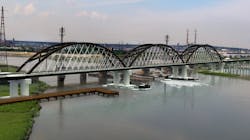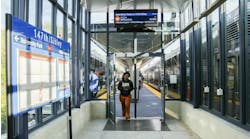Portal North Bridge eligible for CIG funds with upped FTA ranking
The Portal North Bridge project, which will replace a nearly 110-year-old two-track, railroad swing-type drawbridge with serious reliability issues, has earned a Medium-High overall project ranking from the Federal Transit Administration (FTA) in its updated rankings for the Capital Investment Grants (CIG) Program.
The ranking is an improvement from its ranking last year and makes the project eligible for federal funding through the CIG Program. The second Gateway Program project in the CIG Program, the Hudson Tunnel, did not earn a high enough ranking to make it eligible for federal funding.
“We are pleased that the U.S. Department of Transportation has taken this major action toward funding the Portal North Bridge Project. Along with the Hudson Tunnel Project, the Portal North Bridge is a critical part of replacing a 109-year-old unreliable system,” said Gateway Program Development Corporation (GDC) Chairman Steven M. Cohen. “Now we need the new tunnel to also move forward to finally provide 21st Century rail transportation into and out of the nation's economic heart.”
In September 2019, New Jersey Transit submitted an updated financial plan for the Portal North Bridge to the FTA that the agency said addressed the concerns of the administration about whether enough funding sources were identified and committed in the proposal to meet project costs and potential cost overruns.
The Hudson Tunnel also saw revisions to its financial plan that incorporated a $1.4-billion reduction in the project cost. The project also reduced its CIG funding request from $6.8 billion to $5.4 billion, which represents 44 percent of the total project cost. According to the project’s profile on the FTA website, the administration ranked the financial plan as Low and noted that all non-CIG funds were “planned and unspecified.”
Cohen said the project is “mired in federal bureaucracy” despite the steps taken by project partners to reduce the federal government’s financial exposure in the project.
“We will continue to do everything in our power to move this project forward because it is the responsible thing to do for passengers and for the nation’s economic future. However, we ultimately need the federal government as a partner to make this vital national project a reality,” said Cohen.
In July 2019, an analysis conducted by the Northeast Corridor (NEC) Commission staff found commuters who traveled through the North River Tunnel or Portal Bridge experienced nearly 2,000 lost hours in extra transit time between 2014 and 2018.
U.S. Sen Bob Menendez (D-NJ) called the updated rankings, especially the improved Portal Bridge ranking, “the most significant step forward for the Gateway Program since this administration took office.”
“As I have said repeatedly, we can get Gateway done faster and cheaper with President Trump fully onboard. While it is my hope that the advancement of Portal Bridge represents a recognition by the Trump Administration that Gateway is a project of national significance, the continued low ratings for the Hudson River Tunnels show that we must remain vigilant and continue to hold this administration’s feet to the fire,” said Sen. Menendez. “I will not stop fighting until Gateway is fully completed. It is time to end the delays and build a 21st Century transportation network that ensures the continued economic vitality of our state, region and nation.”

Mischa Wanek-Libman | Group Editorial Director
Mischa Wanek-Libman is director of communications with Transdev North America. She has more than 20 years of experience working in the transportation industry covering construction projects, engineering challenges, transit and rail operations and best practices.
Wanek-Libman has held top editorial positions at freight rail and public transportation business-to-business publications including as editor-in-chief and editorial director of Mass Transit from 2018-2024. She has been recognized for editorial excellence through her individual work, as well as for collaborative content.
She is an active member of the American Public Transportation Association's Marketing and Communications Committee and served 14 years as a Board Observer on the National Railroad Construction and Maintenance Association (NRC) Board of Directors.
She is a graduate of Drake University in Des Moines, Iowa, where she earned a Bachelor of Arts degree in Journalism and Mass Communication.


